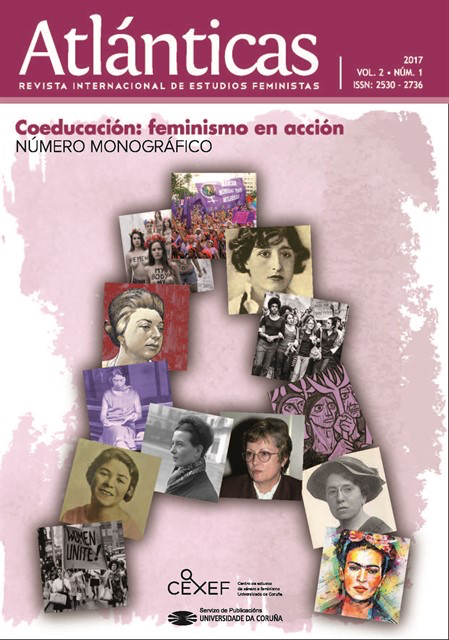Feminism as an indicator of revolutionary coherence. An approach to feminism in the movement 15M
Main Article Content
Abstract
This article shows how the 15M, especially the Acampada de Sol with feminist delegations, represents an exceptional opportunity to deepen the interaction between social movements that advocate a fairer society and feminism. The study addresses the prejudices surrounding feminism that are also seen in this emancipatory space and the strategies that are adopted in front of them. It also reflects on the generational change in the context of the existence of young feminists in 15M. An important part of the study focuses on the testimonies of feminist activists. From these and other sources it is concluded that, being the 15M reflection of the patriarchal society, the interaction space of the Camp allowed feminism to be heard by those who had never done it before and, on the other hand, that 15M offers us important keys about the feminist generational change.
Keywords:
Downloads
Article Details
References
@joanaggrenzer et. al. (2012) R-Evolucionando. Feminismos en el 15-M. Barcelona: Icaria Asaco.
Amorós, Celia (1997). Tiempo de feminismo: sobre feminismo, proyecto ilustrado y postmodernidad. Universitat de València.
Amorós, Celia et. al. (2010). Teoría feminista. De la Ilustración a la globalización. De la Ilustración al segundo sexo (1). Celia Amorós y Ana de Miguel (ed.), Madrid: Minerva.
Antentas, Josep María y Vivas, Esther (2012). Planeta indignado. Ocupando el futuro. Madrid: Sequitur.
Araiza Díaz, Alejandra (2017). Hacia la búsqueda de vidas vivibles. El caso de las Feministes Indignades en Barcelona. Revista de Estudios Feministas, 25 (1), 51-72. doi: http://dx.doi.org/10.1590/1806-9584.2017v25n1p51
Bilbao, María (2011). 15-M. Porque sin nosotros no se mueve el mundo, la revolución será feminista. Viento Sur, 117, 118-123.
Carabantes, Paloma (2012). Acciones de protesta y construcción de discurso feminista en 2012. La Marea Violeta, la Plataforma Decidir Nos Hace Libres y Feminismos Sol del 15M Madrid. Anuari del Conflicte Social, 1, 2, 773-776.
Cobo, Rosa (2002). Democracia paritaria y sujeto político feminista. Anales de la Cátedra Francisco Suárez, 36, 29-44.
Cobo, Rosa (2011) Hacia una nueva política sexual. Las mujeres ante la reacción patriarcal. Madrid: Catarata.
Colectivo Madrilonia (2012). ¡Ocupemos el mundo! En Joseba Fernández; Carlos Sevilla y Miguel Urbán (ed.). Cuando la gente reinventa la política: lenguajes y actitudes del movimiento 15-M (pp. 53-65). Barcelona: Icaria.
De Miguel, Ana (2015) Neoliberalismo Sexual. El mito de la libre elección. Madrid: Cátedra.
Comisión de Feminismos Sol (2011). Dossier de la Comisión de Feminismos Sol. Madrid. Disponible en: http://madrid.tomalaplaza.net/2011/07/22/dossier-de-comision-de-feminista/. Consulta: [14/03/2016].
Ezquerra, Sandra (2011). Andaduras del 15-M y Acampadabcn: Donde el tiempo se ralentiza y los sucesos se condensan. Viento Sur, 117, 113-117.
Ezquerra, Sandra (2012). Discursos y prácticas feministas en el movimiento 15M: avances y asignaturas pendientes. AmecoPress. 27/01/2012. Disponible en: http://amecopress.net/spip.php?article8734. Consulta: [30/11/2017].
Ezquerra, Sandra y Cruells, Marta (2013): Movilización, discursos y practicas feministas del 15M. En Marta Cruells y Pedro Ibarra (eds.), La democracia del futuro. Del 15M a la emergencia de una sociedad civil viva (pp. 131-149). Barcelona:Icaria.
Flesher, Cristina (2014). “Spain is Different”: Podemos and 15-M. Open Democracy. Free Thinking of the World. 29/05/2014.
França, Joao (2013). "El 15-M ha permitido hibridar participación digital y analógica”. Eldiario.es. 22/02/2013. Disponible en: http://www.eldiario.es/catalunya/permitido-hibridar-participacion-digital-analogica_0_103939610.html. Consulta: [16/03/2016].
Freeman, Jo (1972). The Tyranny of Structurelessness. Berkeley Journal of Sociology, 17, 151-164.
Galcerán, Montserrat (2012). Presencia de los feminismos en la Puerta del Sol Madrileña. Youkali, 12, 31-36.
Galdón, Carmen (2016) “La interacción entre los movimientos sociales y el feminismo: El movimiento 15M y la Comisión de Feminismos Sol”. Directora Laura Nuño Gómez. Universidad Rey Juan Carlos. Facultad de Ciencias Jurídicas y Sociales. Disponible en https://eciencia.urjc.es/handle/10115/14382 Consulta: [17/05/2017]
Gámez, María José (2015). Feminisms and the 15M Movement in Spain: Between Frames of Recognition and Contexts of Action. Social Movement Studies, 14, 3, 359-365. doi: https://doi.org/10.1080/14742837.2014.994492
Gamson, William (1992). Talking politics. Cambridge/Nueva York: Cambrige University Press.
Hartmann, Heidi (1988). Un matrimonio mal avenido: hacia una unión más progresiva entre marxismo y feminismo. Zona Abierta, 24, 85-113.
Klandermans, Bert (1994). Los nuevos movimientos sociales. De la ideología a la identidad. En Enrique Laraña y Joseph Gusfield (ed.), La construcción social de la protesta y los campos pluriorganizativos (pp. 183-219).
Madrid: Centro de Investigaciones Científicas (CIS).
Millett, Kate (1969). Política sexual. Madrid: Cátedra.
Shangay, Lili (2011). La Revolución será feminista. Publico.es. Disponible en: http://blogs.publico.es/shangaylily/2011/05/30/la-revolucion-sera-feminista/. Consulta: [21/02/2017].
Valcárcel, Amelia (2008) Feminismo en un mundo global. Madrid, Cátedra.
Valcárcel, Amelia (1997). La política de las mujeres. Valencia. Universitat de València.


